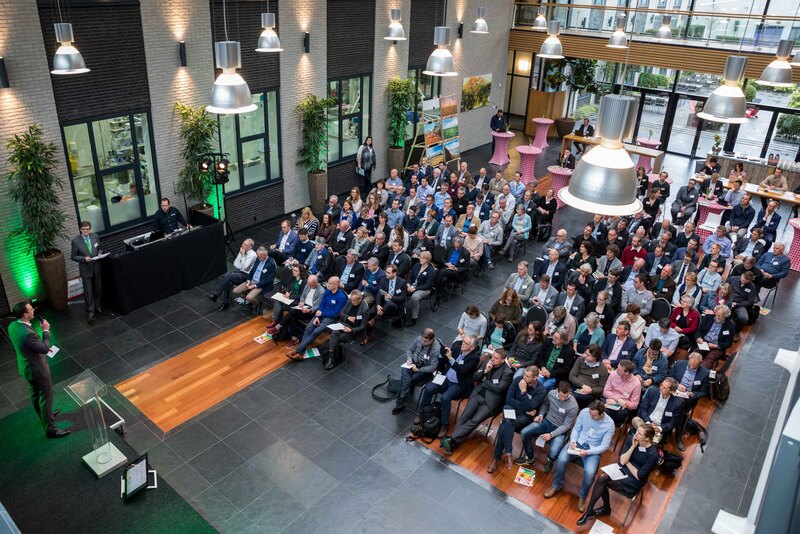
‘Agriculture without chemicals – How?’ Was the challenging topic that attracted more than 150 delegates to the first congress organized by Foodlog held at Koppert headquarters yesterday. Koppert initiated and hosted the congress after the independent Dutch food and health news platform, Foodlog, publicly posed the above question.
The congress was attended by representatives from the Dutch Ministry of Agriculture, Nature and Food Quality, local authorities, academics, environmental NGOs, companies in food production, retail and farmers – both conventional and sustainable – who took part in interactive debates on three themes: ‘How to significantly reduce the impact of agriculture and horticulture on the environment’, ‘How to accelerate the registration of new biological agents for use in this sector’, and ‘How to find commercial opportunities for farmers using sustainable cultivation methods’.
Opening the congress, the Editor of Foodlog, Dick Veerman, said it was time for a new plan for Dutch agriculture and horticulture in order to reinvent its leading role in agricultural practice by developing the promising field of biological solutions: ‘Everyone thinks things are fine, but we are losing our winning edge in this crucial field.There is an urgent need to accelerate the changes needed for more sustainable cultivation.’ In his opening address, Koppert’s Corporate Marketing Director, Peter Maes, added: ‘We urgently need more dialogue on all levels, better informed citizens when it comes to food safety, and a responsible food chain with a minimal impact on the environment and society.’
Crucial need to work together
Flower producer Henric van der Krogt said there was a need for agriculture, horticulture and retailers to pull in the same direction: ‘Sustainable products have an added value, but farmers get nothing extra for their efforts. Retailers rarely ask us what chemicals we use. Price remains the biggest negotiating factor.’ He added that consumer concerns were often neglected in the debate about sustainable cultivation: ‘Don’t wait for the NGOs to take a stand or consumers to protest. Tell consumers our story so that it is relevant to them.’Much of the debate revolved around the need for an integral approach by farmers, retailers, NGOs, consumers and the authorities. ‘We are not talking to each other enough,’ remarked one farmer present.
Registration hurdles
Some of the most heated discussions concerned ‘protracted’, ‘slow’, and ‘over complicated’ registration procedures for biological solutions for use in agriculture and horticulture. Representatives from the Dutch Ministry of Agriculture, Nature and Food Quality and the Dutch Board for the Authorisation of Plant Protection Products and Biocides, fielded a barrage of questions from delegates who pointed out that the Netherlands had some of the longest product assessment and registration procedures in the world. ‘It’s frustrating when I have to tell a farmer that we have a biological solution for his problem, but that it is unlikely to be registered before 2023! I really hope we have opened more effective channels of communication with the ministry,’ said Koppert’s Manager Regulatory Affairs, Evert Hamblok. ‘Another problem is that while consumers demand organic solutions for their food safety, many are sceptical about biological solutions that involve bacteria and viruses. There is still a lot of communications work to be done in this regard.’
Ecology and the EU’s geopolitical urge
Other delegates pointed out that the same regulatory assessment criteria continued to be applied by the authorities to biological solutions as were applied to chemical agents, and that there was a lack of expertise to evaluate the biological components in new products. There was a need to prioritize low risk biological solutions to accelerate the registration procedure, said Professor Michel Haring, Plant Physiologist at the Vrije University of Amsterdam.
Almost a dozen experts spoke on the future of sustainable agriculture and horticulture at the congress. Foodlog will establish an open sourced network of the kind Professor Haring suggested – an idea that was supported by many of the delegates at the congress. Scientists, politicians, farmers, (non) governmental organizations and related businesses will be invited to participate.